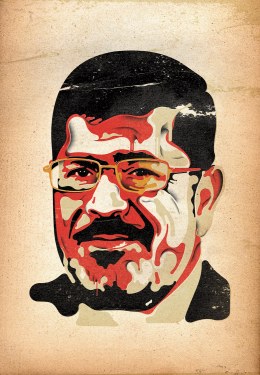
As we talked, other members of the party entered the room, carrying small rugs: it was time for the late-morning prayer, one of five that Islam requires Muslims to perform daily. When Yuri asked if he could take pictures, which many Islamists find intrusive, Morsi hesitated only a moment before agreeing. Then he turned to ask me, “Would you like to join us?” In the Arab world I am frequently taken for a Muslim, and an invitation to prayer is a courtesy akin to being asked to say grace in many Christian homes. On such occasions, I always offer an embarrassed apology, which usually draws either a shrug or a look of disappointment. Morsi’s reaction took me by surprise. “It’s all right,” he said, with a reassuring smile. “I’ll pray for you.”
Morsi’s graciousness had not diminished when we met in late November as a spasm of protests racked the country in response to the emergency decree by which he had granted himself greater power. When he sat with TIME in the marble-and-stucco presidential palace, he seemed concerned less with the clamor against him than with being a considerate host. He spoke in English for our benefit, despite his obvious discomfort with the language, and he tried to illustrate his arguments with Western pop-culture references he thought we would understand.
The political crisis over the constitution is the result of not only what he did but also what he didn’t do. He failed to anticipate the anxiety that non-Islamist Egyptians would feel about an emergency decree that effectively put his decisions, and those of the constituent assembly drafting a new constitution, above the law. He neglected to communicate beforehand that this was designed to prevent the judiciary from stalling the constitution, a plausible concern since the Mubarak-appointed judges had already deep-sixed a previous attempt to write the document. The explanation that accompanied the decree’s announcement was at best peremptory and came with a patronizing subtext: This is good for you, trust me.
Perhaps he calculated that members of the liberal and secular opposition would never trust him: having led the revolution to topple Mubarak, they resented the Islamists’ success in the free and fair vote that followed. Their leaders showed a poor grasp of the democratic process, and the most prominent of them, Nobel Peace laureate Mohamed ElBaradei, didn’t even bother to run in the elections. The liberals showed little appreciation for Morsi’s mostly secular actions in the months before the decree, hinting darkly that he was merely waiting for an opportune moment to unleash an Islamist agenda.
Whatever his reasons for springing the emergency decree without preamble, Morsi gave his liberal opponents a told-you-so moment they would exploit. In turn surprised by the ferocity of their response, he blamed shadowy, Mubarak-era figures for infiltrating the opposition and stirring up violence. It sounded exactly like the sort of thing the dictator himself was saying in the spring of 2011.
The result of the referendum — some parts of the country voted on Dec. 15, and early indications are that yes voters have the edge; the rest will do so on Dec. 22 — will present Morsi with his next tricky challenge. If the draft constitution gets the simple majority it needs to pass, he must persuade the liberals to come in from Tahrir Square: recent history has shown them to be poor losers, so it will fall to him to display his courtly side and be magnanimous in victory. If he doesn’t get the vote he needs, Morsi must create a new constituent assembly in which Islamists and liberals work together, and hope the third time’s the charm. The President is not allowed to intervene in the deliberations of the assembly, but as he offered once before, he certainly can pray for them.

